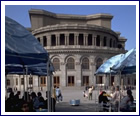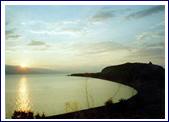Where is Armenia? Armenia is the smallest of the former Soviet
republics, bounded by Georgia to the north, Azerbaijan to the east,
Iran to the south, and Turkey to the west. Aremenia counts amongst
one of the world's oldest civilizations and once included Mount
Ararat, (now in modern day Turkey) the mountain identified in the
bible as being where Noah's ark rested after the flood. Under
Tigrane the Great (fl. 95-55 B.C.) the Armenian Empire reached its
height and became one of the most powerful in Asia, starching from
the Caspian to the Mediterranean Seas. Throughout most of its long
history, however, Armenia has been invaded by a succession of
conquerors- the Greeks, Romans, Persians, Byzantines, Mongols,
Arabs, Ottoman Turks, and the Russians.
From the 16th century through to World War I, significant parts of
Armenia were controlled by the Ottoman Turks, under whom they
experienced discrimination, religious persecution, heavy taxation,
and armed attacks. In response to Armenian nationalist stirrings,
the Turks massacred thousands of Armenians in 1894 and 1896. After
the Turkish defeat in World War I, the independent Republic of
Armenia was established on May 28, 1918, but survived only until
November 29, 1920, when it was annexed by the Soviet Army. On March
12, 1922, the Soviets joined Georgia, Armenia, and Azerbaijan to
form the Transcaucasian Soviet Socialist Republic, which became
part of the U.S.S.R. In 1936, after a reorganization, Armenia
became a separate constituent republic of the U.S.S.R.
Armenia declared its independence from the collapsing Soviet Union
on September 23, 1991. An Armenian Diaspora has existed throughout
the nation's history, and Armenian emigration has been
particularly heavy since independence from the Soviet Union. An
estimated 60% of the total eight million Armenians worldwide live
outside the country, with one million each in the U.S. and Russia.
Significant Armenian communities are located in Georgia, France,
Iran, Lebanon, Syria, Argentina, and Canada.
Armenia – acknowledged as one of the cradles of civilization – is a
beautiful country with a sophisticated people and a long and
cultured history. As a result, Armenia is an intriguing tourist
destination. Numerous monuments and masterpieces of the Ancient era
and Middle Ages can be found throughout the country. Tourism in
Armenia is rooted in the country's historical landmarks and
natural attractions such as the water resorts of Lake Seventh hot
springs of Arzni and Jermuk, the forests of Dilijan, Aghveran,
Tsaghkadzor, Bjurakan and Gugark, and the mountainous natural caves
and cliffs of the Southeast region. The 5165 meter Mount Ararat,
geographically located in Turkey, is a national symbol of Armenia
and is visible from much of the Southwest region.

 The majestic peaks of Mount Ararat provide a stunning
backdrop to Yerevan. The monastery of Khor-Virab and the ruins of
the ancient city of Dvin (dating back to the second century BC) are
located in the mid-distance Aerial view of Yerevan, capital of
Armenia Statue of Komitas, one of Armenia's most loved
composers, outside the Komitas Conservatory. Apart from writing
many original composition, Komitas travelled the country noting
down folk songs for posterity Yerevan, which is nestled in the
shadow of the snow-capped heights of the majestic mount Ararat,
where the Biblical Noah's Ark first landed escaping the Great
Flood, is the capital city of Armenia. With a population numbering
over 1.2 million, Yerevan is a bustling city. The central plaza,
Republic Square, is designed in the Armenian national style and
houses the Government House, the Cabinet and other governmental
offices as well as the Erebuni and Armenia hotels.
The majestic peaks of Mount Ararat provide a stunning
backdrop to Yerevan. The monastery of Khor-Virab and the ruins of
the ancient city of Dvin (dating back to the second century BC) are
located in the mid-distance Aerial view of Yerevan, capital of
Armenia Statue of Komitas, one of Armenia's most loved
composers, outside the Komitas Conservatory. Apart from writing
many original composition, Komitas travelled the country noting
down folk songs for posterity Yerevan, which is nestled in the
shadow of the snow-capped heights of the majestic mount Ararat,
where the Biblical Noah's Ark first landed escaping the Great
Flood, is the capital city of Armenia. With a population numbering
over 1.2 million, Yerevan is a bustling city. The central plaza,
Republic Square, is designed in the Armenian national style and
houses the Government House, the Cabinet and other governmental
offices as well as the Erebuni and Armenia hotels.
Also situated on Republic Square are the Armenian History Museum
and the Art Gallery of Armenia. Here, one finds informative and
interesting models and artefacts of ancient Urartu and Armenia. In
the Art Gallery one finds a worthy section on Armenian art from the
seventh century AD. Amongst the many other museums in the capital
city, the two most interesting house museums are those of landscape
artist Martiros Saryan (1880-1972) and twentieth century composer
Aram Khatchaturyan.
 Yerevan, the ancient capital of Armenia, extends you a
warm and friendly welcome. It is one of the oldest cities in the
world. The earliest recorded settlement there dates back to 782 BC.
King Argishty I founded a fortress city in the north-eastern part
of present-day Yerevan, with the following cuneiform inscription,
“With the majesty of God Khald, Argishty, son of Menua, built
up this inaccessible castle and named it Erebuni…” You can
still see relics from this part of our history at the Erebuni
Museum in Yerevan.
Yerevan, the ancient capital of Armenia, extends you a
warm and friendly welcome. It is one of the oldest cities in the
world. The earliest recorded settlement there dates back to 782 BC.
King Argishty I founded a fortress city in the north-eastern part
of present-day Yerevan, with the following cuneiform inscription,
“With the majesty of God Khald, Argishty, son of Menua, built
up this inaccessible castle and named it Erebuni…” You can
still see relics from this part of our history at the Erebuni
Museum in Yerevan.
 As you explore the many interesting sights in Yerevan, you will
learn about the culture and history of one of the world's
oldest nations.
As you explore the many interesting sights in Yerevan, you will
learn about the culture and history of one of the world's
oldest nations.
If you would like more information about Armenia, contact the
author of this article, Mr Mushegh Gevorgyan, who can assist with
tours, visas and translation services: tours@orient.am







 The majestic peaks of Mount Ararat provide a stunning
backdrop to Yerevan. The monastery of Khor-Virab and the ruins of
the ancient city of Dvin (dating back to the second century BC) are
located in the mid-distance Aerial view of Yerevan, capital of
Armenia Statue of Komitas, one of Armenia's most loved
composers, outside the Komitas Conservatory. Apart from writing
many original composition, Komitas travelled the country noting
down folk songs for posterity Yerevan, which is nestled in the
shadow of the snow-capped heights of the majestic mount Ararat,
where the Biblical Noah's Ark first landed escaping the Great
Flood, is the capital city of Armenia. With a population numbering
over 1.2 million, Yerevan is a bustling city. The central plaza,
Republic Square, is designed in the Armenian national style and
houses the Government House, the Cabinet and other governmental
offices as well as the Erebuni and Armenia hotels.
The majestic peaks of Mount Ararat provide a stunning
backdrop to Yerevan. The monastery of Khor-Virab and the ruins of
the ancient city of Dvin (dating back to the second century BC) are
located in the mid-distance Aerial view of Yerevan, capital of
Armenia Statue of Komitas, one of Armenia's most loved
composers, outside the Komitas Conservatory. Apart from writing
many original composition, Komitas travelled the country noting
down folk songs for posterity Yerevan, which is nestled in the
shadow of the snow-capped heights of the majestic mount Ararat,
where the Biblical Noah's Ark first landed escaping the Great
Flood, is the capital city of Armenia. With a population numbering
over 1.2 million, Yerevan is a bustling city. The central plaza,
Republic Square, is designed in the Armenian national style and
houses the Government House, the Cabinet and other governmental
offices as well as the Erebuni and Armenia hotels.
 Yerevan, the ancient capital of Armenia, extends you a
warm and friendly welcome. It is one of the oldest cities in the
world. The earliest recorded settlement there dates back to 782 BC.
King Argishty I founded a fortress city in the north-eastern part
of present-day Yerevan, with the following cuneiform inscription,
“With the majesty of God Khald, Argishty, son of Menua, built
up this inaccessible castle and named it Erebuni…” You can
still see relics from this part of our history at the Erebuni
Museum in Yerevan.
Yerevan, the ancient capital of Armenia, extends you a
warm and friendly welcome. It is one of the oldest cities in the
world. The earliest recorded settlement there dates back to 782 BC.
King Argishty I founded a fortress city in the north-eastern part
of present-day Yerevan, with the following cuneiform inscription,
“With the majesty of God Khald, Argishty, son of Menua, built
up this inaccessible castle and named it Erebuni…” You can
still see relics from this part of our history at the Erebuni
Museum in Yerevan.
 As you explore the many interesting sights in Yerevan, you will
learn about the culture and history of one of the world's
oldest nations.
As you explore the many interesting sights in Yerevan, you will
learn about the culture and history of one of the world's
oldest nations.
 Becky introduces me to my host, Mr Sijaona. He is a
small wiry man with a purposeful stride. He welcomes me into his
house. I gaze around at the crumbling walls and the total lack of
comfort. But then he says in halting English that his other house
is better, (two wives, therefore two houses) – so I pick up my
suitcase and follow him down the dusty street.
Becky introduces me to my host, Mr Sijaona. He is a
small wiry man with a purposeful stride. He welcomes me into his
house. I gaze around at the crumbling walls and the total lack of
comfort. But then he says in halting English that his other house
is better, (two wives, therefore two houses) – so I pick up my
suitcase and follow him down the dusty street.
 We are sorry to say that Mac is not very well, but he is still
e-mailing strong and recently sent the Beetle a collection of
travel reminiscences about Australia, camels which takes us to
India and then back to Australia.
We are sorry to say that Mac is not very well, but he is still
e-mailing strong and recently sent the Beetle a collection of
travel reminiscences about Australia, camels which takes us to
India and then back to Australia.